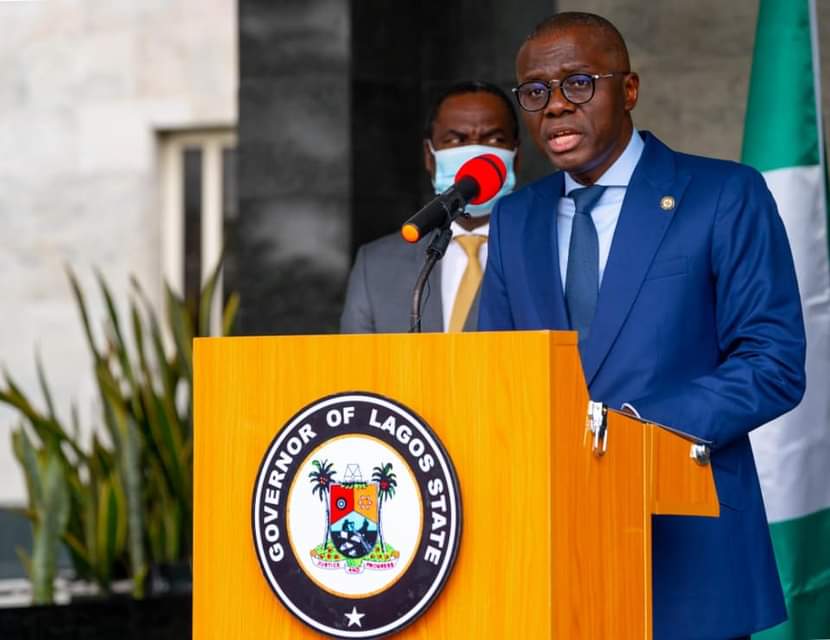Business
How ‘Leggedes’ Emerged King Of Lagos Roads

The taste of the pudding, an adage has it, is in the eating.
Many well-meaning Nigerians were clamouring for the removal of subsidy on Premium Motor Spirit (PMS), famous in Nigeria as petrol, because the subsidy regime was laced with corruption, while enriching few privileged and unscrupulous business people.
Efforts by several successive governments, including military regimes, could not summon enough courage to put an end to the menace. Why? It was always met with stiff resistance from the masses.
The fear of mass revolt and resistance discouraged several governments from taking the bull by the horn, despite counsel from well-informed and well-meaning individuals and organisations, including the World Bank.
However, the President Bola Ahmed Tinubu administration has bitten the bullet.
The date, May 29 has come to be known in Nigeria as democracy day.
However, when President Tinubu welcomed himself to office on May 29, 2023 with the stern announcement ‘subsidy is gone’, the day transformed into the day hardship was born to many people.
It was first greeted with confusion, which saw several filling stations shutdown; then an adjustment of the pump prices of petrol from N180 to N490 per litre in the Lagos area.
The removal of subsidy also saw marketers selling at different prices in different parts of Nigeria, with prices per litre, ranging from N490 to N750.
The signal, meant a new day, indeed a day of adversity to many Nigerians. But it appears that the people are confronting the demon with tenets in Robert H Schuller’s bestseller, “Tough Times Never Last, But Tough People Do”.
All over the world, Nigerians are famous for courage and their ‘can do spirit’. So it appears that with the shock, Nigerians quickly swung to survival modes.
Consequently, the unveiling of tough times by President Tinubu has seen Nigerians mutate to their tough sides. After all, life must go on.
How People in the Lagos Area Are Adapting
In the Lagos area, the working class have resorted to hibernating, rotation, trekking, skipping meals, cooking at the office, two-or-three-day working week, remote working, e-trading, among others, to keep themselves going.
An administrative manager with a manufacturing concern in the Ikeja area of Lagos State, Elendu Uwarue, lives in Gowon Estate, Ipaja.
He copes with the subsidy removal which has seen transportation cost from his house to office move from N800 to N2500 per day by hibernating.
He said, “I commute twice a week, Mondays and Fridays. I leave for the office very early, so that I can join those who hustle with their private cars at affordable rates on Monday.
“I hibernate at the office till Friday when I also make sure that I leave late to ensure that I don’t spend too much on transportation.”
In a related situation, a banker, Tosin Olaito, informed Biztellers that in her department, they have fallen back to survival instincts and resorted to rotation.
What this means according to Olaito, is that, not everyone has to be physically on duty every day.
A department of 10 people can opt to have three or four people on seat to take on the day’s tasks. Others can support remotely.
For those who have been wondering why several banking halls are sparsely populated by employees, this might be one of the reasons.
“We agree among ourselves who should be physically present and who can be sending in in-swingers. On the day you’re to support from your location, you will quickly go the branch nearest to your house and sign-in, and you’re good to go,” she said.
Transporters Lament
Biztellers reports that transporters are lamenting because the prevailing economic situation does not permit them to adjust charges to cover escalating costs from the subsidy removal.
A transporter, Segun Olawuyi, took to his Facebook page to lament that while cost of petrol, a major input for the business has gone up by over 300 percent, they are only able to increase charges by 50-100 percent in some cases.
Olawuyi wrote, “This is not a good time for transport business. Imagine paying three times what you used to, for petrol only to charge about 100 percent what you used to.”
Biztellers’ investigations revealed that fares have increased, albeit marginally in some cases. There are some extreme cases where no increase has been recorded at all.
For instance, a shuttle within the Ikeja business district used to be N100 per trip in commercial buses, say from Ikeja under-bridge to Alausa-Secretariat-Express. But it has increased to N150 per trip.
Another transporter, Olopo Andy told Biztellers that they had to reduce the fare from N200 to N150 when they noticed that majority of the people turned to ‘legging it’ instead of riding in the buses.
“Oga na leggedes be king now o. Since (President) Tinubu enter, na so, so trek people dey trek o. We no dey see passenger carry again,” he lamented.
Biztellers observed that several people were trekking the estimated four-six-kilometer distance between Express-Ikeja-Along through Awolowo Road to Express-Alausa area.
Walking long distances to and from work, business locations and other places has become increasingly popular with the people having no choice.
Some people have been asserting, albeit jokingly that those trekking in Nigeria because of hardship would soon earn her a world record in the Guinness World Records (GWR).
General impact
The greatest impact of the fuel subsidy removal might yet be in the in the mounting angst among the populace. Everything imaginable has seen their prices jumped through the roof, including foodstuffs. This has left the populace irritable.
People are lamenting everywhere about economic hardship. The public outcry doesn’t seem to be heading anywhere near the ears of those in power with fears becoming palpable that any little thing can ignite public outrage of uncontrollable measures.
However, a public affairs analyst, Charles Ikewe told Biztellers that it doesn’t all have to do with the subsidy.
“There was hardship before President Tinubu was sworn in,” he started. “What is evident,” he continued, “is that things have gone from bad to worse, which the masses can longer bear.”
He traced it to previous governments who could not make bold and timely policy pronouncements.
The cumulative result from Ikewe’s perspective might be best expressed in the words of a former American President, Abraham Lincoln, “You can fool all the people some of the time, and some of the people all the time, but you cannot fool all the people all the time.”
As things stand, the removal of subsidy on petrol has enthroned ‘leggedess’ as king of Nigerian roads, but only time will tell how long it would be and how the people react to it.
Business
Savannah Energy Provides Unaudited FY 2024 Trading Updates

Savannah Energy has shared a trading update on its Nigerian operations and other markets in Africa, including up-to-date cash collections in its Nigerian business.
According to the update, made available on Thursday in Lagos, its gross production in Nigeria averaged 23.1 Kboepd for FY 2024, broadly in line with the prior year’s 23.6 Kboepd, of which 88% was gas (FY 2023: 91%).
On the update, CEO of Savannah Energy, Andrew Knott, said, “I am pleased to provide a FY trading update which demonstrates the continued progress we have made in 2024, a year which saw the highest level of cash collections ever recorded by our Nigerian business. 2025 is expected to be an exciting year for our Company: we have a large planned operational programme in Nigeria which is anticipated to enhance both our oil and gas production levels and capacity; we intend to progress our R3 East oil development project in Niger; we continue to pursue key acquisitions in the upstream oil and gas space; and we continue to seek to build our power business.
“Fundamentally, Savannah remains unequivocally an “AND” company, seeking to deliver strong performance both for the short AND long term across multiple fronts, and pursuing growth opportunities in both the hydrocarbon AND power sectors.”
The update It also shows that it generated a Total Income of US$393.6 million in 2024, compared to FY 2023’s US$289.8 million. This consists of Total Revenues of US$258.7 million and Other operating income of US$134.9 million.
The report also shows that Savannah’s FY 2024 Total Revenues were ahead of the previously issued financial guidance of greater than US$245 million, while FY 2024 financial guidance is reiterated for Operating expenses plus administrative expenses at ‘up to US$75 million’. The company expects its FY 2024 capital expenditure to come in lower than planned (previously guided at ‘up to US$50 million’) due to the phasing of spend.
ALSO READ: CSR: Dangote Awards Scholarships To 473 Students
According to the update, Savannah’s cash collections in 2024 amounted to US$248.5 million, a slight increase from the US$206 million it received in 2023. The report further shows that its cash balances as at 31 December 2024 stood at US$32.6 million, compared to the 31 December 2023 figure of US$107.0 million.
The report shows that the company’s midstream subsidiary, Accugas Limited, had as at 31 December 2024 drawn down on its NGN332 billion of the NGN Transitional Facility, with the resulting funds being converted to US$, which, along with cash held, was used to partially prepay the existing Accugas US$ Facility, leaving a balance as at 31 December 2024 of approximately US$212.3 million.
The report also provided new updates on Accugas’ US$45 million Uquo Central Processing Facility (“Uquo CPF”) compression project in Nigeria, noting that its commissioning which will enable the expansion of gas production in the medium term is well underway.
The report highlighted the progress being made in the procurement process of long lead equipment in Nigeria for a potential two-well drilling campaign on the Uquo Field in H2 2025, with an additional gas development well expected to add up to 80 MMscfpd of supplemental production capacity and a potential exploration well targeting an Unrisked Gross gas initially in place (“GIIP”) of 154 Bscf (25.7 MMboe) of incremental gas resources.
The update shows that progress is also being made in the planned Savannah acquisition of Sinopec International Petroleum Exploration and Production Company Nigeria Limited, whose principal asset is a 49% non-operated interest in the Stubb Creek oil and gas field (“Stubb Creek”), with regulatory approval and completion being targeted in Q1 2025. Following the completion of the acquisition, Savannah intends to commence an expansion programme which is anticipated to increase Stubb Creek gross production from an average of 2.7 Kbopd in 2024 to approximately 4.7 Kbopd.
In Niger, Savannah continues to seek to progress its 35 MMstb (Gross 2C Resources) R3 East oil development in South-East Niger, while it continues to push for a potential alternative transaction structure to acquire a material stake in producing oil and gas assets in South Sudan as previously announced on 20 December 2024.
On the renewable energy front, the update shows that Savannah has up to 696 MW of renewable energy projects currently in motion, including the up to 250 MW Parc Eolien de la Tarka wind farm project in Niger and the up to 95 MW Bini a Warak hybrid hydroelectric and solar project in Cameroon. A firm believer in Africa’s transition to renewable energy, Savannah continues to target a portfolio of up to 2 GW+ of power projects in motion by the end of 2026.
Business
Nigeria Can Achieve 5.5% GDP Growth – NESG
The Nigerian Economic Summit Group (NESG) has projected that the country has the potential to achieve a 5.5% growth in Gross Domestic Product (GDP) if critical policy reforms are sustained.
This was disclosed on Thursday during the launch of the NESG’s 2025 Macroeconomic Outlook report.
Speaking at the event, the Chief Economist and Director of Research & Development at NESG, Dr. Olusegun Omisakin, highlighted the need for more efficient policy implementation to unlock Nigeria’s economic potential.
READ MORE: Davido Is Richer Than His Billionaire Father – Ibrahim Chatta Claims
“We believe at the optimal level, if we embark on more efficient policy reforms, the Nigerian economy has the potential, the GDP to end up at 5.5 per cent, and we believe that this is achievable,” Omisakin stated.
More to follow……….
Business
CBN Approves Release Of Nigerian FX Code
The Central Bank of Nigeria (CBN) has announced the release of the Nigerian Foreign Exchange (FX) Code, a set of guidelines designed to promote ethical conduct among authorized dealers in the country’s FX market.
In a statement, the apex bank disclosed that the official launch of the Code would take place on Tuesday, January 28, 2025, at the CBN Head Office Auditorium in Abuja.
READ MORE: Dangote Denies Culpability In Pumping Up Petrol Price
“The Central Bank of Nigeria has approved the release of the Nigerian Foreign Exchange (FX) Code as a guideline to the banking industry to promote the ethical conduct of authorised dealers in the Nigerian Foreign Exchange Market,” the statement read.
The introduction of the FX Code is expected to enhance transparency, accountability, and professionalism within Nigeria’s foreign exchange ecosystem, aligning it with global best practices.
The event is anticipated to attract key stakeholders in the financial and banking sectors, as well as representatives from authorized FX-dealing institutions across the country.























